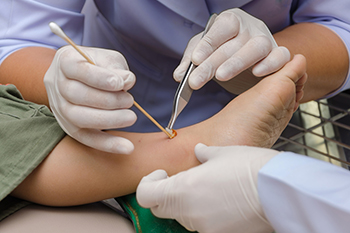
The removal of dead or infected skin tissue is known as debridement. This procedure also eliminates foreign materials from tissue. Debridement promotes the growth of healthy tissue, minimizes scarring, and reduces infection complications. Not all wounds require debridement. It is typically used for non-healing old wounds, chronically infected wounds, or those at risk of infections. Severe or new wounds might also need debridement. The choice of debridement depends on factors like wound type, age, overall health, and risk for complications. Methods include biological debridement using sterile maggots, enzymatic debridement with ointments, autolytic debridement harnessing the body's enzymes, and mechanical debridement as the most common approach. Sharp debridement, both conservative and surgical, involves cutting off unhealthy tissue. Recovery varies but typically takes 6 to 12 weeks. Careful wound management, including regular dressing changes and hygiene, is crucial. Although complications are possible, debridement's benefits often outweigh the risks. If you have a foot wound that persists or appears infected, it is strongly suggested that you see a podiatrist for immediate treatment, which might include debridement.
Wound care is an important part in dealing with diabetes. If you have diabetes and a foot wound or would like more information about wound care for diabetics, consult with one of our podiatrists from Palm Beach Foot & Ankle. Our doctors will assess your condition and provide you with quality foot and ankle treatment.
What Is Wound Care?
Wound care is the practice of taking proper care of a wound. This can range from the smallest to the largest of wounds. While everyone can benefit from proper wound care, it is much more important for diabetics. Diabetics often suffer from poor blood circulation which causes wounds to heal much slower than they would in a non-diabetic.
What Is the Importance of Wound Care?
While it may not seem apparent with small ulcers on the foot, for diabetics, any size ulcer can become infected. Diabetics often also suffer from neuropathy, or nerve loss. This means they might not even feel when they have an ulcer on their foot. If the wound becomes severely infected, amputation may be necessary. Therefore, it is of the upmost importance to properly care for any and all foot wounds.
How to Care for Wounds
The best way to care for foot wounds is to prevent them. For diabetics, this means daily inspections of the feet for any signs of abnormalities or ulcers. It is also recommended to see a podiatrist several times a year for a foot inspection. If you do have an ulcer, run the wound under water to clear dirt from the wound; then apply antibiotic ointment to the wound and cover with a bandage. Bandages should be changed daily and keeping pressure off the wound is smart. It is advised to see a podiatrist, who can keep an eye on it.
If you have any questions, please feel free to contact our offices located in Boynton Beach, Palm Beach Gardens, and West Palm Beach, FL . We offer the newest diagnostic and treatment technologies for all your foot care needs.
